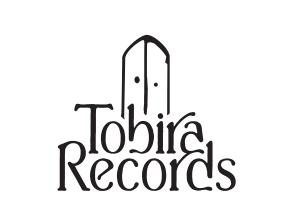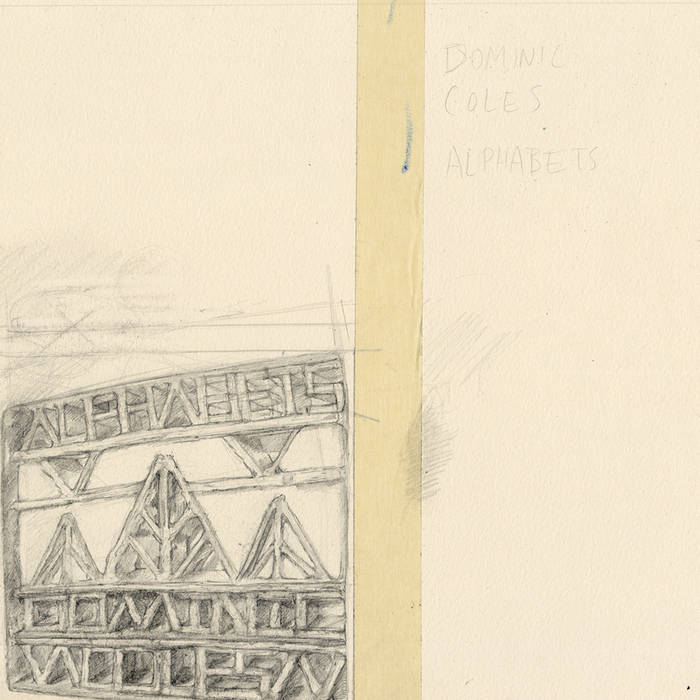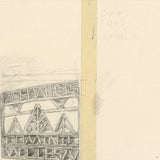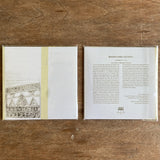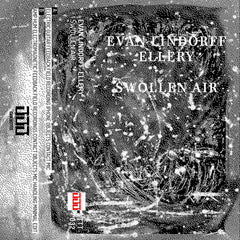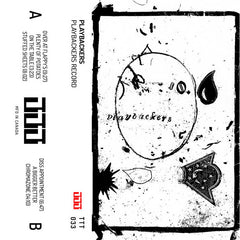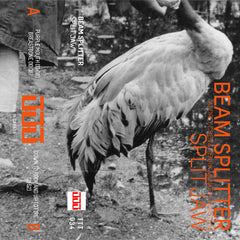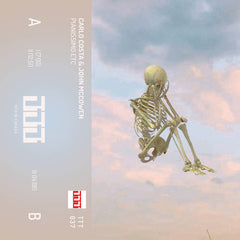Dominic Coles // Alphabets CD
- Availability:
New York experimental musician/writer Dominic Coles released a limited edition of 2023 CDs from New York's experimental label Tripticks in June 6.
Contains 3 pieces of computer collage sound poetry.
The following is a commentary by the writer himself.
"alphabet
*Interpretation aims to find the determinants of the behavior of the subject as a whole by reducing the signifier to its non-meaning (absence of meaning) rather than clarifying the meaning.
* mom's words
I used to play a game when I was a kid.Hear any word repeated over and over again as it loses meaning in your mouth.Every time it repeats, it becomes strange, clumsy and alien.
There is something different about our language, and our voice as a conductor for that language.Just think of the infinite embarrassment of hearing a recording of your own voice!The awkwardness of listening to a recording of your own voice.And it is only in the mouths of others that our words become clear.The words in our mouths and hearts are actually foreign and not our own.
Because we are born into a world of prefabricated discourses, the linguistic world of our parents and caretakers.Before we are born, we have rooms, names and spaces in the language world of our parents.This language is placed in us, and insofar as it brings desires that are its favorite companions, it is also their desires that are placed in us.
Alphabet listening materializes this alienation in language.It begins didactically.Each word taken from a spoken dream fragment is associated with an abstract synthetic sound.Alphabet is developed within this electronic sound, and repetition reinforces the association between words and synthesized sounds, allowing the listener to continue making those associations even after the audio disappears.Two studies of alphabet listening were early attempts to activate this process and evoke newly encoded voices in the listener's mind.
Alphabet 1: push uses its own synthetic alphabet, places it in a musical context, and converts these phonetic-related sounds into uncoded musical tones (sounds not known to be phonetically related). ).The tone becomes a form of interference or signal jamming, and the listener loses contact with the original word.Synthetic alphabets are still easy to associate with voices, but it becomes almost impossible to find the original verbal content.
It is the power of the auditor that can make this lost language work through the content of the recollected dream fragment and the context of the listening.The auditor can interject with his tongue, his language, his associations where meaning has been lost.Once a language is fixed, it becomes a cage.Language determines our movements within it and our ideas about what is possible and what could be.Working with the signifier or signifier itself is to transform this cage, to understand that nothing in the world is fixed, but fundamentally transmutable and subject to transmutation. .For this purpose, both the listener and the subject of the listener itself are transformed in the audition.
But work is needed to make this transformation a reality.At this point, I would like to emphasize the great effort required on the part of the listener to work with the signifier.It takes real effort to hear each word as a new codification.It is a demanding, difficult and sometimes tedious process.But isn't that true of all the work we do with ourselves? "
+ + +
Below is an explanation by Sunik Kim.
"Dominic Coles' introduction of the possibility of boredom into the act of listening is in itself commendable. We are exposed to passive boredom every day. Whether it's the endless logistics to get it, or more precisely, the bottomless flood of art that tries to minimize the friction between the listener and the sound, the many things that lie between your listening device and the bare waves. It seeks to hide, rather than expose, mediation layers and obstacles.The traces of difficulty and ease are all too easily transferred to the surface of the sound material itself.Friction or lack thereof is inevitable. It is merely given a formal life in neat divisions and classifications into separate, readable genre buckets.
It's wonderful that this collection of studies (lessons) is permeated with humor and wittyness.This dynamism is manifested through layers of misalignment, discontinuity, and contradiction.Between pre-written texts and sometimes sloppily spoken, trailing recordings, seemingly utterly abstract and almost snappy moments of aural expression (insect chirps here, muted trumpets there). between text and synthesis.By bringing these discrepancies to the surface rather than hiding them, the work finds a fulcrum of piston movement that not only easily pushes us from one module to the next, but also creates a strange artificiality in the act of listening itself. Shining a light on sex and stubbornness inseparable from the world.The work leaks out, but this maintains and enhances rather than cuts off its primal roots.
By being organically drawn into this pedagogical process, this is a natural invitation that is welcomed, not simply commanded, but laser-focused on the qualities and interactions of the material at hand. .The moments when everything comes together, when patterns and gestures that were once strangely connected become familiar, even catchy, precede moments when everything falls apart and meaning disappears.In the process, we become active, creating a new, unheard of language made up of fragments of the old and the familiar.This newness, like our own transformation, is entirely private.But as a result, the joy and intensity of the work disappeared.And the world begins to hum and tremble at the newly discovered possibilities of change. "
+ + +
Below are the names of each track.
1. Alphabet 1: push
Two Lessons in Alphabet Listening
2. I am in the open field with my brother and father.We were running, trying to get away from them, but at some point we found ourselves surrounded by them.I hope that by disappearing, I can stay hidden and start looking elsewhere without them finding me.We can't see them, but the men are coming very close.I accidentally stepped on a twig and heard the twig snap.One of the men began searching the air with the barrel of his rifle.Now he's coming up to me with a gun, but if I leave, he'll be caught with a bang.I focused on where the gun touched my body and created a space or hole in my stomach that slowly opened up to allow the gun to pass through me without touching my body.He advances the gun, puts it in me, and puts it back.They seemed convinced we weren't there anymore and moved on.
3. My family moved to an old palatial ruin on this island.There are many people involved in the construction to make it easier to live there, and they are waiting for the start of work.However, the ceiling fan embedded in the roof makes a high-pitched, insect-like noise.In this out-of-reach circular hole.The hole needs to be filled with concrete, but my father won't let me fill it until the bug is removed.I'm walking along small wooden planks like a rope walker over them.My father says that we cannot rebuild the building while burying the bugs.Parents started arguing.
Labels and other worksplease use this form. ///Click here to see more Tripticks Tapes releases available at Tobira.
------------------------
Ask us for digital files.
Text by Sunik Kim via the label:
"Dominic Coles' introduction of the possibility of tedium—work—to the listening act is laudable in its own right. We are daily barraged with a passive tedium, whether in the form of the job, the endless logistics of life and sustenance, or— to put a finer point on it—a bottomless flood-tide of art that seeks to reduce to an absolute minimum the friction between listener and sound, to invisibilize rather than surface the many mediating layers and obstacles between the listening apparatus and the bare wave. Any semblance of “difficulty” or “ease” is all too easily shifted onto the surface of the sound-materials themselves: the friction, or lack thereof, is granted merely formal life in its inevitable sorting and categorization into a discrete, legible genre- bucket.
It is Wonderful, The Collection of Studies, or Lessons, Is Shot Through with a Humor and Lightness That Makes THE WORK STRANGELY INVITING -ANVITING TIVE-EVEN in ITS Weight. This Dynamic Manifests Through Severly Layers of Slippage, Disjunction, Contradiction: Between PRE-WRITTEN TEXT And SOMETI Mes Sloppily Spoken, Trailing-Off Recording; Between a Seemingly Total Abstraction and Almost Pithy Moments of Aural Represcription (Buzzing Insec TS HERE, A Muted Trumpet THERE); Between Text and Synthesis, Which at Times to Trigger One Another, at OtherS to BE MEANDERING in COMPLETE OPPOSINGIN Ctions. In Surfacing, Rather Than Tucking Away, These Slippages, The Work Finds A Fulcrum, A Piston Movement, That Not ONLY PUSHES US EASILY from ONE MODU Le to the next, but also shines a light on the overtening activity of the over and itself and is Stubborn inextricability from the World as Such. Work Leaks - But this preserves, Heightens, Rather Than Severs, it Fundamental Rootedness.
In being organically drawn into this pedagogical process—and this is a natural invitation made welcoming through a laser-focus paid to the qualities and interactions of the materials at hand, not simply by decree—we are then drawn into a game of pattern recognition, a tracing or mapping of memory and its processes, with real stakes. The moments where it all comes together—where the once strange interlinked patterns and gestures become familiar, even catchy—precede moments where everything falls apart and meaning dissipates. we are made active, forging a new, unheard language that is composed of fragments of the old, the familiar. This newness is wholly private, as is our own attendant transformation; is there even a way to express the substance of this transformation to others But the joy and intensity of the work has vanished in the result. And the world begins to hum—tremble—with the newfound possibility of change."
Artist: Dominic Coles
Label: Tripticks Tapes
New York experimental musician/writer Dominic Coles released a limited edition of 2023 CDs from New York's experimental label Tripticks in June 6.
Contains 3 pieces of computer collage sound poetry.
The following is a commentary by the writer himself.
"alphabet
*Interpretation aims to find the determinants of the behavior of the subject as a whole by reducing the signifier to its non-meaning (absence of meaning) rather than clarifying the meaning.
* mom's words
I used to play a game when I was a kid.Hear any word repeated over and over again as it loses meaning in your mouth.Every time it repeats, it becomes strange, clumsy and alien.
There is something different about our language, and our voice as a conductor for that language.Just think of the infinite embarrassment of hearing a recording of your own voice!The awkwardness of listening to a recording of your own voice.And it is only in the mouths of others that our words become clear.The words in our mouths and hearts are actually foreign and not our own.
Because we are born into a world of prefabricated discourses, the linguistic world of our parents and caretakers.Before we are born, we have rooms, names and spaces in the language world of our parents.This language is placed in us, and insofar as it brings desires that are its favorite companions, it is also their desires that are placed in us.
Alphabet listening materializes this alienation in language.It begins didactically.Each word taken from a spoken dream fragment is associated with an abstract synthetic sound.Alphabet is developed within this electronic sound, and repetition reinforces the association between words and synthesized sounds, allowing the listener to continue making those associations even after the audio disappears.Two studies of alphabet listening were early attempts to activate this process and evoke newly encoded voices in the listener's mind.
Alphabet 1: push uses its own synthetic alphabet, places it in a musical context, and converts these phonetic-related sounds into uncoded musical tones (sounds not known to be phonetically related). ).The tone becomes a form of interference or signal jamming, and the listener loses contact with the original word.Synthetic alphabets are still easy to associate with voices, but it becomes almost impossible to find the original verbal content.
It is the power of the auditor that can make this lost language work through the content of the recollected dream fragment and the context of the listening.The auditor can interject with his tongue, his language, his associations where meaning has been lost.Once a language is fixed, it becomes a cage.Language determines our movements within it and our ideas about what is possible and what could be.Working with the signifier or signifier itself is to transform this cage, to understand that nothing in the world is fixed, but fundamentally transmutable and subject to transmutation. .For this purpose, both the listener and the subject of the listener itself are transformed in the audition.
But work is needed to make this transformation a reality.At this point, I would like to emphasize the great effort required on the part of the listener to work with the signifier.It takes real effort to hear each word as a new codification.It is a demanding, difficult and sometimes tedious process.But isn't that true of all the work we do with ourselves? "
+ + +
Below is an explanation by Sunik Kim.
"Dominic Coles' introduction of the possibility of boredom into the act of listening is in itself commendable. We are exposed to passive boredom every day. Whether it's the endless logistics to get it, or more precisely, the bottomless flood of art that tries to minimize the friction between the listener and the sound, the many things that lie between your listening device and the bare waves. It seeks to hide, rather than expose, mediation layers and obstacles.The traces of difficulty and ease are all too easily transferred to the surface of the sound material itself.Friction or lack thereof is inevitable. It is merely given a formal life in neat divisions and classifications into separate, readable genre buckets.
It's wonderful that this collection of studies (lessons) is permeated with humor and wittyness.This dynamism is manifested through layers of misalignment, discontinuity, and contradiction.Between pre-written texts and sometimes sloppily spoken, trailing recordings, seemingly utterly abstract and almost snappy moments of aural expression (insect chirps here, muted trumpets there). between text and synthesis.By bringing these discrepancies to the surface rather than hiding them, the work finds a fulcrum of piston movement that not only easily pushes us from one module to the next, but also creates a strange artificiality in the act of listening itself. Shining a light on sex and stubbornness inseparable from the world.The work leaks out, but this maintains and enhances rather than cuts off its primal roots.
By being organically drawn into this pedagogical process, this is a natural invitation that is welcomed, not simply commanded, but laser-focused on the qualities and interactions of the material at hand. .The moments when everything comes together, when patterns and gestures that were once strangely connected become familiar, even catchy, precede moments when everything falls apart and meaning disappears.In the process, we become active, creating a new, unheard of language made up of fragments of the old and the familiar.This newness, like our own transformation, is entirely private.But as a result, the joy and intensity of the work disappeared.And the world begins to hum and tremble at the newly discovered possibilities of change. "
+ + +
Below are the names of each track.
1. Alphabet 1: push
Two Lessons in Alphabet Listening
2. I am in the open field with my brother and father.We were running, trying to get away from them, but at some point we found ourselves surrounded by them.I hope that by disappearing, I can stay hidden and start looking elsewhere without them finding me.We can't see them, but the men are coming very close.I accidentally stepped on a twig and heard the twig snap.One of the men began searching the air with the barrel of his rifle.Now he's coming up to me with a gun, but if I leave, he'll be caught with a bang.I focused on where the gun touched my body and created a space or hole in my stomach that slowly opened up to allow the gun to pass through me without touching my body.He advances the gun, puts it in me, and puts it back.They seemed convinced we weren't there anymore and moved on.
3. My family moved to an old palatial ruin on this island.There are many people involved in the construction to make it easier to live there, and they are waiting for the start of work.However, the ceiling fan embedded in the roof makes a high-pitched, insect-like noise.In this out-of-reach circular hole.The hole needs to be filled with concrete, but my father won't let me fill it until the bug is removed.I'm walking along small wooden planks like a rope walker over them.My father says that we cannot rebuild the building while burying the bugs.Parents started arguing.
Labels and other worksplease use this form. ///Click here to see more Tripticks Tapes releases available at Tobira.
------------------------
Ask us for digital files.
Text by Sunik Kim via the label:
"Dominic Coles' introduction of the possibility of tedium—work—to the listening act is laudable in its own right. We are daily barraged with a passive tedium, whether in the form of the job, the endless logistics of life and sustenance, or— to put a finer point on it—a bottomless flood-tide of art that seeks to reduce to an absolute minimum the friction between listener and sound, to invisibilize rather than surface the many mediating layers and obstacles between the listening apparatus and the bare wave. Any semblance of “difficulty” or “ease” is all too easily shifted onto the surface of the sound-materials themselves: the friction, or lack thereof, is granted merely formal life in its inevitable sorting and categorization into a discrete, legible genre- bucket.
It is Wonderful, The Collection of Studies, or Lessons, Is Shot Through with a Humor and Lightness That Makes THE WORK STRANGELY INVITING -ANVITING TIVE-EVEN in ITS Weight. This Dynamic Manifests Through Severly Layers of Slippage, Disjunction, Contradiction: Between PRE-WRITTEN TEXT And SOMETI Mes Sloppily Spoken, Trailing-Off Recording; Between a Seemingly Total Abstraction and Almost Pithy Moments of Aural Represcription (Buzzing Insec TS HERE, A Muted Trumpet THERE); Between Text and Synthesis, Which at Times to Trigger One Another, at OtherS to BE MEANDERING in COMPLETE OPPOSINGIN Ctions. In Surfacing, Rather Than Tucking Away, These Slippages, The Work Finds A Fulcrum, A Piston Movement, That Not ONLY PUSHES US EASILY from ONE MODU Le to the next, but also shines a light on the overtening activity of the over and itself and is Stubborn inextricability from the World as Such. Work Leaks - But this preserves, Heightens, Rather Than Severs, it Fundamental Rootedness.
In being organically drawn into this pedagogical process—and this is a natural invitation made welcoming through a laser-focus paid to the qualities and interactions of the materials at hand, not simply by decree—we are then drawn into a game of pattern recognition, a tracing or mapping of memory and its processes, with real stakes. The moments where it all comes together—where the once strange interlinked patterns and gestures become familiar, even catchy—precede moments where everything falls apart and meaning dissipates. we are made active, forging a new, unheard language that is composed of fragments of the old, the familiar. This newness is wholly private, as is our own attendant transformation; is there even a way to express the substance of this transformation to others But the joy and intensity of the work has vanished in the result. And the world begins to hum—tremble—with the newfound possibility of change."
Artist: Dominic Coles
Label: Tripticks Tapes
